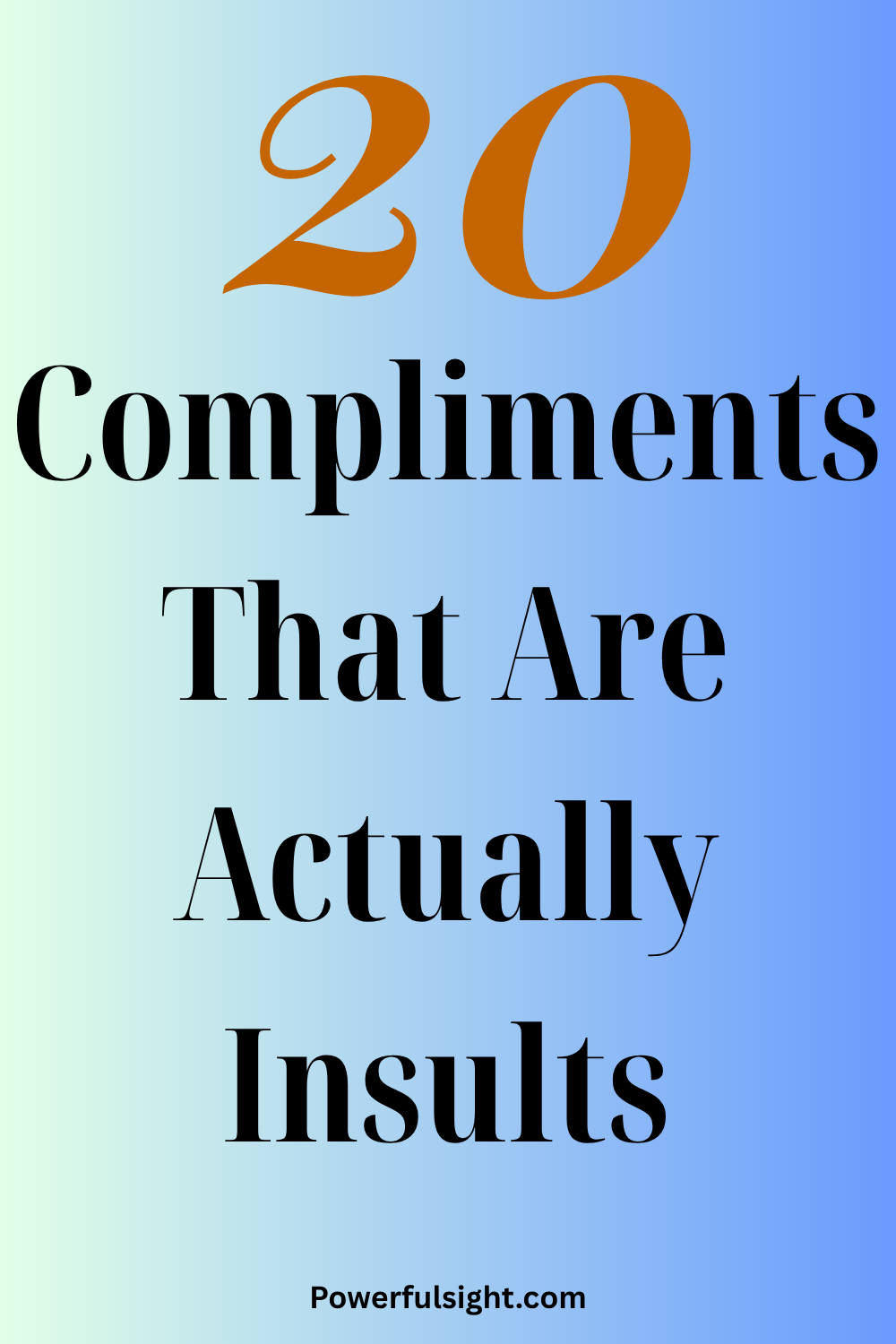Not all compliments are created equal. At times, people disguise their envy, disapproval, or quiet criticism beneath a thin layer of politeness, dressing their true opinions in words that sound kind but carry an unpleasant undertone.
These “backhanded compliments” can leave you suspended in confusion—partially flattered yet vaguely insulted. You smile out of courtesy, nodding along, but inside your mind you are replaying the words, trying to decode them. Was that supposed to be a compliment? Or something entirely different?
The truth is, not every kind remark is made in good faith. Some people use flattery as a mask for judgment, comparison, or subtle superiority. What sounds like praise at first can reveal something else beneath—a quiet jab, a reminder of your flaws, or a small seed of doubt planted in your confidence.

Compliments That Are Actually Insults
1. “You look great for your age.”
At first glance, it sounds like appreciation—a generous acknowledgment of how well you appear. But linger for a moment, and the compliment begins to sour. The hidden message says, you look old, but not entirely terrible.
Instead of admiring your beauty or vitality, it draws unnecessary attention to your age, as though your worth has already begun to fade. A genuine compliment would stop at “you look great,” without the faint sting of comparison to youth or time gone by.
Related: How To Get Your Life Together
2. “I wish I could be as carefree as you.”
On the surface, these words sound admiring, even wistful. But beneath them lies a quiet criticism. What the speaker often means is that they see you as reckless, unserious, or perhaps immature. It is a polite way of saying, you don’t seem to have your life together, but I suppose that’s your charm. This sort of remark can sound like praise but feels more like pity disguised as admiration.
Related: How To Do a Hard Reset For Your Life At Any Age
3. “You’re so brave to wear that.”
This is one of those statements that pretends to celebrate confidence while quietly judging taste. When someone says this about your outfit, they are rarely applauding your style. More often, they are implying that what you are wearing is unusual, revealing, or unflattering—but they want to sound polite while saying it. It is the verbal equivalent of smiling while raising an eyebrow. The message underneath is, I wouldn’t dare wear that myself, but you’ve clearly chosen to take the risk.
Related: How To Improve Communication Skills
4. “You’ve lost so much weight—you look amazing now!”
At first, it feels like encouragement. But if you listen closely, it carries an insult to your past self. It suggests that before you lost weight, you were not worth admiring. This kind of compliment ties beauty and worth to appearance alone, erasing all the other parts of who you are. True praise would recognize health, confidence, or strength—not a simple number on a scale.
Related: How To Do a Hard Reset For Your Life At Any Age
5. “You’re surprisingly smart.”
This one stings in silence. The word “surprisingly” reveals the truth: the person didn’t expect intelligence from you. Maybe it’s because of how you look, speak, or dress. Whatever the reason, it shows they carried a low opinion of you and were merely caught off guard. Genuine respect never needs to sound astonished.
Related: 8 Effective Ways to Get Your Life Back on Track
6. “You look so much better when you smile.”
This phrase, though often repeated, is not as kind as it sounds. It implies that your natural, relaxed face is unappealing or unpleasant. It dismisses your emotions and places the responsibility for others’ comfort on your expression. A real compliment would honor authenticity—you have a beautiful smile—without suggesting that you should wear it constantly for approval.
7. “I love how you don’t care what people think.”
At first, this seems like admiration for confidence. Yet often it’s said when someone thinks your choices are questionable. It can mean, you make strange decisions, but at least you seem content with them. It’s praise laced with skepticism, the kind of comment that applauds your courage while silently criticizing your judgment.
Related: How To Compliment A Girl On Her Looks
8. “You clean up nicely.”
This backhanded remark implies that most of the time, you don’t look your best. It acknowledges that you can appear attractive when you make an effort, while quietly suggesting that effort is rare. A sincere compliment would be direct: You look wonderful tonight, without reminding you of what you supposedly look like on an ordinary day.
9. “You’re so independent; I could never be alone that much.”
While it sounds like respect for self-sufficiency, this phrase often carries a tone of pity or disbelief. It implies that solitude is something to be pitied rather than valued. The subtext is, you must be lonely, even if you don’t realize it. Genuine admiration for independence doesn’t question or romanticize it—it simply acknowledges it as strength.
10. “You’re not like other girls (or guys).”
This statement tries to make you feel special, but it does so by tearing others down. It divides rather than uplifts, implying that most people of your gender are inferior, and you’re the rare exception. What sounds like flattery actually puts pressure on you to live up to someone else’s narrow idea of uniqueness.
Related: How To Respond To Compliments Without Saying Thank You
11. “You’re so photogenic!”
At face value, it sounds like a compliment. But often, it carries an undertone of surprise—as if to say, you look better in pictures than in real life. It separates your photographed self from your physical presence, as though your beauty only exists through a lens.
12. “You look tired.”
Few sentences can ruin someone’s mood faster. It might sound caring, but it’s not. It’s another way of saying, you look worn out, pale, or unwell. It draws attention to flaws without offering comfort or help. If concern is genuine, kindness would sound more like, Are you doing okay? not an observation of fatigue.
13. “I could never pull that off.”
This phrase might seem admiring, but its tone can shift depending on context. Sometimes it’s meant sincerely, but other times it implies that your choice is bold, odd, or ill-advised. The hidden message says, what you’re wearing is brave… but not in a good way.
14. “You’re such a good listener.”
While it can be a true compliment, it is sometimes used by people who talk too much. They mean, thank you for not interrupting me, rather than appreciating your empathy or attentiveness. It’s praise that serves their comfort more than your character.
Related: Cute Compliments for Women To Make Her Blush
15. “You’re so lucky.”
Luck dismisses effort. When people say this, it can sound like they’re admiring your success, but they’re also erasing the hard work, persistence, or discipline behind it. True appreciation recognizes the effort behind an achievement, not just the outcome.
16. “You’re so exotic.”
This phrase often appears to be admiring, but it objectifies. It turns someone’s appearance or heritage into something foreign, unusual, or “other.” It’s not celebrating beauty—it’s categorizing it. What sounds like fascination is actually distance in disguise.
17. “You’ve got such a pretty face.”
When someone says this instead of “you’re beautiful,” it separates your face from the rest of your body. The implication is clear: the rest doesn’t match up. A real compliment wouldn’t dissect your appearance—it would embrace the whole of who you are.
Related: 90 Cute Compliments for Guys That Will Blow His Mind
18. “You’re so lucky to have a partner like that.”
At first, it sounds warm and supportive, but beneath it lies a quiet insult. It subtly implies your partner is out of your league, or that you somehow don’t deserve them. A balanced compliment would acknowledge the relationship as mutual—you two are great together—not one-sided.
19. “You’re so real.”
This one depends entirely on tone. Sometimes it means authentic, but other times it means rough, blunt, or unrefined. It can be used to suggest that you lack polish or sophistication, wrapped neatly in the language of praise.
20. “You’re too pretty to be single.”
This final example might sound flattering, but its message is rooted in assumption. It suggests that beauty should automatically guarantee a relationship, and that being single must mean something is wrong with you. A true compliment would never measure your value by your relationship status.
Why These Compliments Hurt More Than They Help
Backhanded compliments sting because they confuse the listener. The tone says “nice,” but the meaning says “not quite.” They play on insecurities and make you question whether the speaker truly meant to be kind. At their core, these remarks mix admiration with subtle criticism, leaving you unsure which part to believe.
Sometimes, people give them unintentionally. They want to sound clever or kind but lack the self-awareness to hear how their words come across. In other cases, the motive is less innocent—envy, superiority, or discomfort dressed up as flattery.
Whatever the reason, the effect is the same: you walk away smiling on the outside and shrinking a little on the inside.
How to Handle Backhanded Compliments
The best response often depends on who’s giving them and why.
If it’s a friend who simply chose the wrong words, you might respond with humor or clarity: “Thanks—I think?” or “Did you mean that as a compliment?” It gives them a chance to rephrase without confrontation.
If it’s a habitual offender—someone who cloaks judgment in politeness—you can choose distance or directness. A calm, confident reply such as “I know you mean well, but that sounded a bit off,” can reset the tone. The key is to protect your peace without lowering yourself to their level.
And sometimes, silence speaks best. A smile, a nod, and a firm change of subject can signal that the conversation doesn’t deserve your energy.
Final Thoughts
True compliments have warmth. They make you feel seen, appreciated, and confident. They carry no comparison, no backhanded surprise, no conditional approval. They come from sincerity, not subtle competition.
The next time someone tells you, “You’re brave to wear that,” or “You look great for your age,” remember that words often reveal more about the speaker than the subject. Accept what is kind, leave behind what is cruelly wrapped, and never let another person’s disguised opinion disturb your peace.
And when you give compliments yourself, let them be clean, kind, and free of hidden meaning. Praise doesn’t need cleverness or disguise—it needs only honesty.
Save the pin for later.

- 15 Outdoor Christmas Decoration Ideas - 07/12/2025
- How to Stop Arguing Over Small Things - 07/12/2025
- 10 Signs Your Partner Genuinely Respects You - 06/12/2025